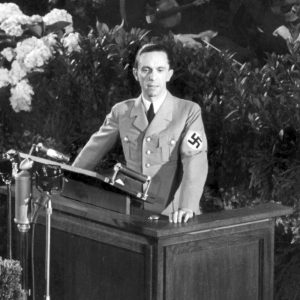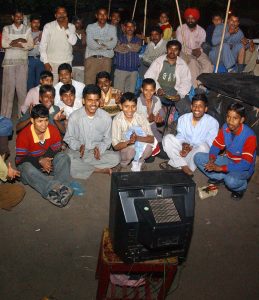Finally, propaganda will take over literature (present and past) and history, which must be rewritten according to propaganda’s needs. We must not say: this is done by tyrannical, autocratic, totalitarian governments. In fact, it is the result of propaganda itself. Propaganda carries within itself, of intrinsic necessity, the power to take over everything that can serve it.
One cannot make just any propaganda any place for anybody. While propaganda is focused on reaching the individual, it cannot only rely on building off what already exists in the individual. Propaganda must also attach itself to the pre-existing fundamental currents of the society it seeks to influence. The propagandist must know the current tendencies and the stereotypes among the public he is trying to reach. These are indicated by principal symbols of the culture the propagandist wishes to attack since these symbols express the attitudes of a particular culture. Individuals are part of a culture and are therefore psychologically shaped by that culture. The main task of propaganda is to utilize the conditioned symbols as transmitters of that culture to serve its purpose. Propaganda must be a reflection of the fundamental structures of society to be successful and not contradictory of existing opinions. A skillful propagandist does not try to change mass opinion or go against an accepted structure. Only a bad propagandist would make a direct attack on an established, reasoned, durable opinion, accepted cliché, or fixed pattern. Each individual harbors a large number of stereotypes and established tendencies; from this arsenal the propagandist must select those easiest to mobilize, those which will give the greatest strength to the action he wants to precipitate.
Propaganda: The Formation of Men’s Attitudes (1965/1973) (French: Propagandes; original French edition: 1962) is a book on the subject of propaganda by French philosopher, theologian, legal scholar, and sociologist Jacques Ellul. This book appears to be the first attempt to study propaganda from a sociological approach as well as a psychological one. It presents a sophisticated taxonomy for propaganda, including such paired opposites as political–sociological, vertical–horizontal, rational–irrational, and agitation–integration. The book contains Ellul’s theories about the nature of propaganda to adapt the individual to a society, to a living standard and to an activity aiming to make the individual serve and conform.





![Manufacturing consent e832b3072cf0093ecd0b4401ef444f94eb6ae3d01db2144493f7c17d_640[1]](https://cognitive-liberty.online/wp-content/uploads/e832b3072cf0093ecd0b4401ef444f94eb6ae3d01db2144493f7c17d_6401-300x200.jpg)
![YouTube warns: #Saveyourinternet ec3db80b21f51c3e815b410cee45449efe76e7d11bb6104490f2c9_640[1]](https://cognitive-liberty.online/wp-content/uploads/ec3db80b21f51c3e815b410cee45449efe76e7d11bb6104490f2c9_6401-300x255.jpg)



![Operation Mockingbird page2-701px-Family_jewels_of_the_Central_Intelligence_Agency.pdf[1]](https://cognitive-liberty.online/wp-content/uploads/page2-701px-Family_jewels_of_the_Central_Intelligence_Agency.pdf1_.jpg)


